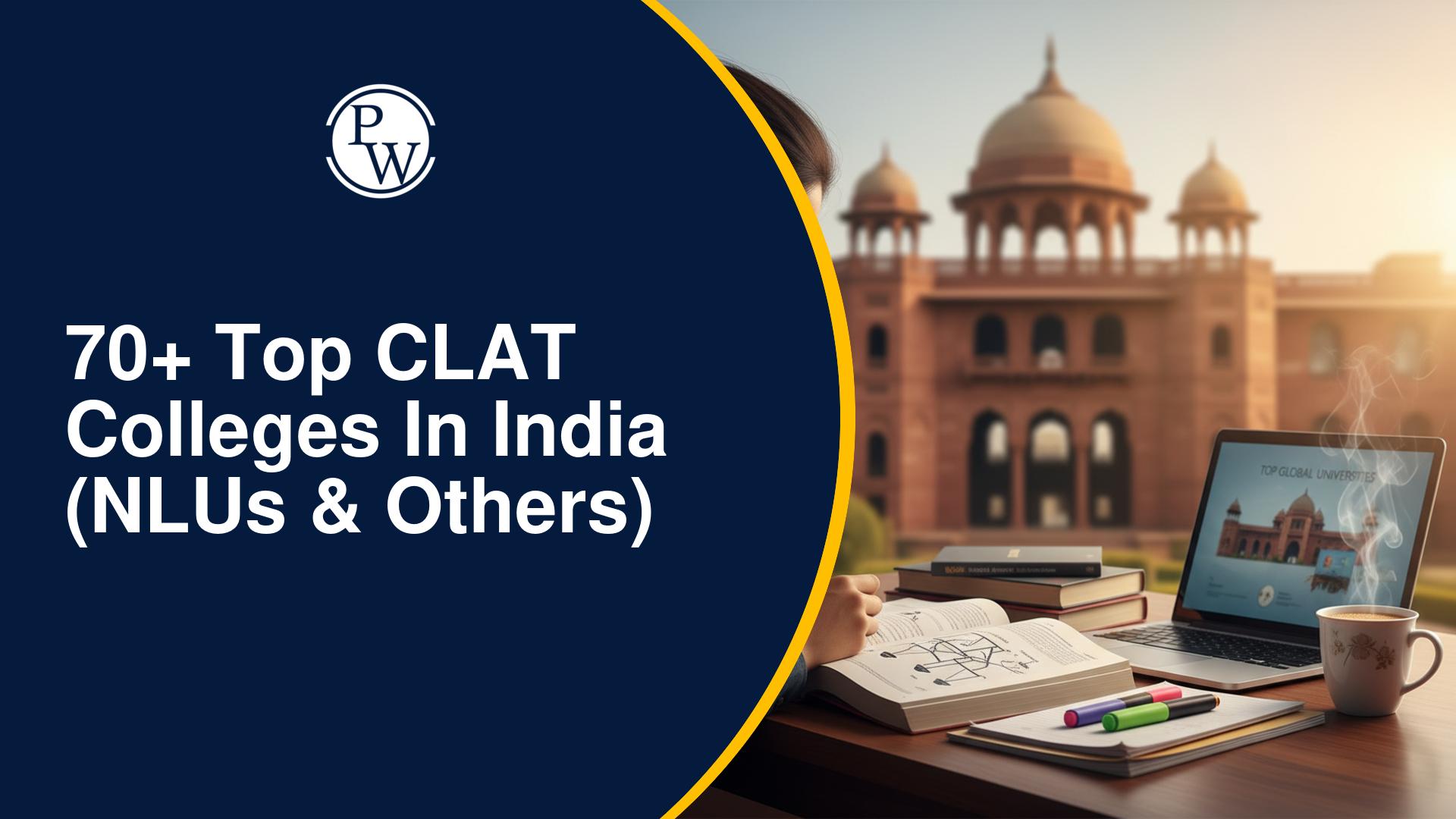
6 Different Types of Law Degrees in India: The legal profession is one of the oldest and popular professions in India. From foundational UG degrees to advanced PG and Doctoral degrees, the legal system is structured to provide comprehensive knowledge and specialization opportunities. The career opportunities are also increasing due to the advancement and involvement of the legal system in society. Moreover, to become a legal professional, candidates must obtain a law degree and have a formal education at some level. Based on their interests and goals, candidates can pursue any law degree.
What is a Law Degree?
A law degree is an academic qualification that provides knowledge of legal principles, systems, and processes. It trains students with the skills to interpret, analyze, and apply laws in various contexts. This prepares them for careers as legal professionals, advisors, or academics. Law degrees in India can be pursued at undergraduate, postgraduate, and doctoral levels, each offering different specializations and career opportunities. Earning a law degree is the foundational step toward practicing law and contributing to the justice system.
6 Different Types of Law Degrees in India
Candidates can apply to study law and obtain a legal degree after completing their intermediate education. The following are 6 different types of Law Degrees in India, which you can consider.
1. Bachelor of Laws (BA LLB): It is the most common form of legal education in India. It is a 5-year course combining the study of law with arts subjects like political science, sociology, and economics. It is designed to provide a strong foundation in both legal principles and liberal arts. Based on the specialization and job roles, law graduates can earn up to 7 LPA in India. Some of the versatile career opportunities after completing a BA LLB degree include.
- Advocate
- Legal Advisor
- Judiciary
- Legal Outsourcing
- Writer Of Law Books /Reports /Journalist
- Legal Analyst
- Legal Researcher
2. Integrated Undergraduate Law Degree in India: Unlike the traditional way of completing a separate bachelor’s degree followed by a three-year LLB, integrated law courses allow students to earn dual degrees within a single, streamlined curriculum immediately after finishing Class 12. It is a 5-year law course that combines a bachelor’s degree in a specific discipline-such as Arts, Science, Commerce, or Business Administration, with professional legal education. Some of the integrated degrees are as follows.
- B.A. LL.B.
- B.Sc. LL.B.
- BBA. LLB.
- B.Com. LL.B.
These degrees are offered by mostly autonomous law schools. Diverse career opportunities open after completion of the degree. An average salary package of 7-8 LPA is offered to the graduates. Some of the popular legal fields that candidates can explore are as follows.
- Public Prosecutor
- Legal Expert
- Attorney General
- Notary
- Company Secretary
- Law Reporter
- Magistrate
- District and Sessions Judge
3. Master of Laws (LLM): It is a postgraduate degree for law graduates to specialize in specific areas of law, such as constitutional law, corporate law, or international law. LLM is the most popular PG degree in law and can be of 1 or 2 years ' duration. The average salary of LLM graduates ranges between 8-15 LPA in India, depending on their job roles and location. Here are some career opportunities for LLM graduates.
- Civil Judge
- Lawyers or Attorneys
- Property Lawyer
- Criminal Lawyer
- Intellectual Property Lawyer
4. Doctor of Philosophy (PhD) of Law: The Doctor of Philosophy (PhD) in Law is a research-focused doctoral program designed for those seeking to contribute original scholarship to the field of legal studies. The course can be completed in a maximum of 5 years. This degree enables candidates to delve deeply into specialized legal topics. The career prospects after completing a PhD in law are as follows.
- Writer of Law Books /Reports
- Journalist
- Legal Researcher
- Teaching
- Deputy Program Manager
- Administrative Coordinator
- Legal Manager
- Legal Counsel
- Legal Consultant
- Legal Affairs Manager
- Legal Officer
5. Master of Business Law (M.B.L): It is a specialized postgraduate program designed to equip graduates and professionals with advanced knowledge of business and commercial laws relevant to the corporate sector. This program is ideal for those aiming to enhance their legal expertise for leadership roles in business and industry. Here are some career opportunities.
- Law Officer
- Legal Advisor
- Chief Financial Officer
- Assistant Manager
- Legal Assistant
6. Integrated MBL-LLM/MBA-LLM: Integrated MBL-LLM and MBA-LLM programs are dual-degree courses that blend advanced legal education with business or management studies. This degree provides expertise in both legal and business domains. Some career opportunities after completing an MBL-LLM/MBA-LLM degree in India are as follows.
- Law Officer
- Legal Advisor
- Chief Financial Officer
- Assistant Manager
- Payroll Specialist
- Legal Assistant
- Court Magistrate
- Corporate Lawyer
- Taxation Lawyer
Eligibility Criteria for Different Law Courses in India
Before applying for any law degree, candidates must fulfill the following eligibility criteria.
1. 3-year LLB Eligibility Criteria
The following are the main pointers related to the LLB eligibility criteria.
- Candidates must have completed a bachelor’s degree in any discipline from a recognized university.
- The minimum marks required in the qualifying degree depend on the institution you are applying to.
2. 5-year LLB Eligibility Criteria
Here are the eligibility criteria for 5-year LLB courses.
- Candidates must have passed the Class 12th (10+2) or equivalent examination from a recognized board.
- The minimum aggregate marks for is 45% in the qualifying exam for general category candidates. For SC/ST or reserved categories, the minimum marks required are 40%.
3. LLM Eligibility Criteria
Check out the LLM eligibility criteria.
- Candidates must have completed a Bachelor’s degree in law (either a 3-year LLB or a 5-year integrated LLB) from a recognized university or institution.
- Candidates must have the minimum aggregate marks as prescribed by the universities to apply for LLM admissions.
4. PhD Eligibility Criteria
The following are the eligibility criteria for PhD courses in law.
- Candidates must have a Master’s degree or equivalent in a relevant field from a recognized university.
- Admission generally requires qualifying for a national or university-level entrance exam such as UGC NET, CSIR NET, GATE, or a university-specific test.
Different Types of Law Degree Specializations
There are many different types of specializations in which candidates can earn their law degree. According to their interests and personal goals, candidates can choose from the fields. The following are some common law degree specializations in India.
- Admiralty Law
- Business Law
- Constitutional Law
- Criminal Law
- Environmental Law
- First Amendment Law
- Health Care Law
- Intellectual Property Law
Is Law Degree Hard or Easy?
A Law Degree is not difficult to pursue. It all depends on how you perceive it. If a candidate has a strong inclination towards law and the legal framework, it may be a suitable option. However, for a better understanding of the law degree, candidates must have a comprehensive knowledge of subjects. Ultimately, whether a law degree feels hard or easy depends on an individual’s aptitude, dedication, and interest in the subject.
6 Different Types of Law Degrees in India FAQs
What is the difference between a 3-year LLB and a 5-year integrated law degree?
Can I specialize in a particular area of law during my undergraduate studies?
What are the eligibility criteria for pursuing an LLM in India?
Can I pursue law after completing a degree in another field?
What career options are available after obtaining a law degree in India?










